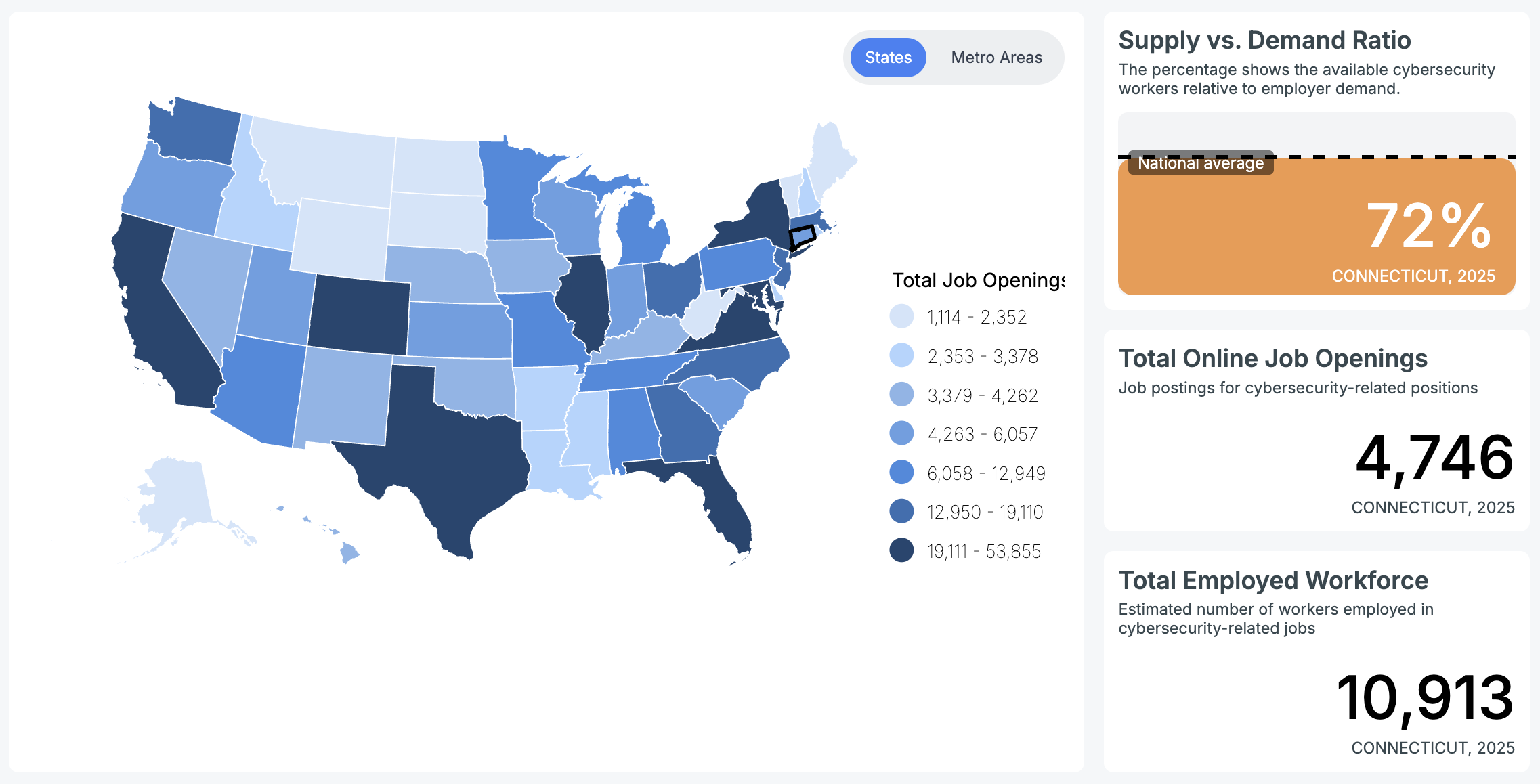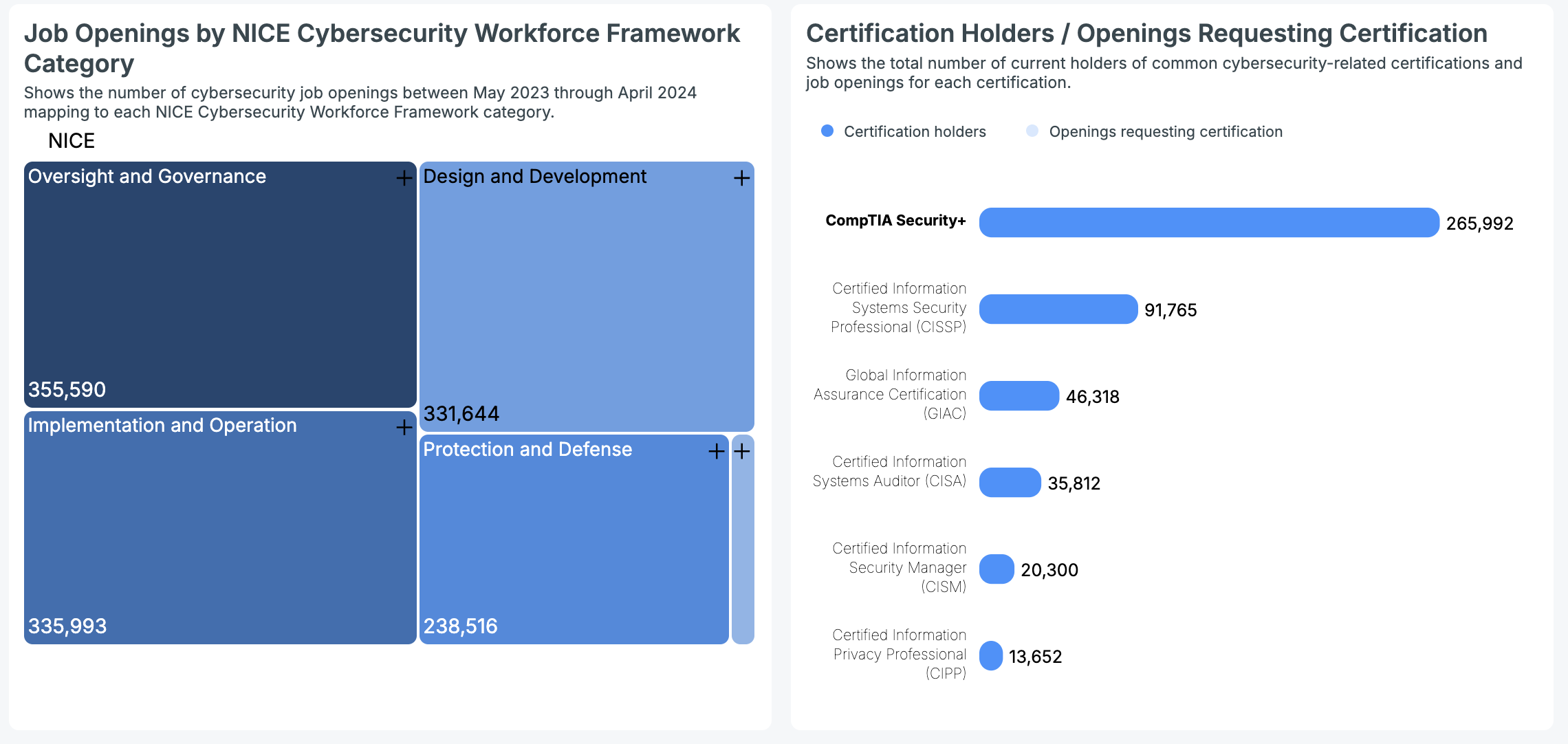- Associate degree
- Bachelor’s degree
- Master’s degree
- Cybersecurity certifications
- Cybersecurity in Connecticut
- Jobs in Connecticut
This guide is all about cybersecurity schools in Connecticut. It also contains information about the cybersecurity certification and online training options available in the state.
Connecticut is all about insurance. With 2.7 percent of all working adults employed in some capacity by the insurance industry, Connecticut is the number one state in the country in terms of per capita insurance employment.
Those jobs tend to be well paying, well above the national average, and they benefit not only the employees who work them but also the state.
It’s estimated that each year the insurance industry contributes $14 billion to Connecticut’s GSP (Gross State Product).
Ad
cybersecurityguide.org is an advertising-supported site. Clicking in this box will show you programs related to your search from schools that compensate us. This compensation does not influence our school rankings, resource guides, or other information published on this site.
Featured Cybersecurity Degree Programs
| School Name | Program | More Info |
|---|---|---|
| Southern New Hampshire University | Online BS in Cybersecurity or Online MS in Cybersecurity | website |
| Syracuse University | Online MS in Cybersecurity | Complete in 15 Months | website |
| University of New Haven | Master of Science in Cyber Risk Management | website |
| Purdue Global | Online BS in Cybersecurity | website |
| UC Berkeley School of Information | Master’s in Cybersecurity | No GRE/GMAT Required | website |
In addition to being America’s insurance capital, Connecticut is also known for supplying America’s military.
Electric Boat (a division of General Electric) recently signed a hefty $22 billion contract with the Navy. Under the terms of the contract, Electric Boat will build nine new submarines at an impressive cost of just under $2.5 billion per vessel.
These submarines will be the most advanced models ever built and their design specifications will be a closely guarded secret. China is infamous for “borrowing” military plans and that’s a practice the US would like to put an end to.
But what can insurance and naval construction possibly have in common? The answer is simple: there is a strong demand for cybersecurity personnel.
As cybercrime becomes increasingly sophisticated banking losses can run into the hundreds of millions. That’s a large number on its own; however, taken together, the figures are even more staggering. One report estimates that “cybercrime will cost the world $10.5 trillion annually by 2025.”
Related resources
With stakes this high, insurance companies are incentivized to push for increased cybersecurity within their organizations and also in the organizations that they insure. And the risk of China gaining access to classified military documents is not a threat to be taken lightly.
In summary, whether it’s guarding top-secret plans for nuclear submarines or protecting corporate assets, cybersecurity is a must. Thankfully, Connecticut has proven proactive in its approach to combating cybercrime.

Growing importance of cybersecurity in Connecticut
In 2019, Connecticut was determined to make sure that foreign actors would not influence the 2020 election. To protect the integrity of the voting process, Connecticut will be taking advantage of $5 million allocated to the state for that express purpose.
According to Denise Merrill, Connecticut’s Secretary of the State, “We want to make sure that we can do everything we can to make sure this is the smoothest election we’ve ever had.” That means preventing cyberattacks and educating the residents of Connecticut about the ins and outs of election fraud.
In addition to election fraud monitoring, Connecticut has its own Cyber Task Force. Patricia M. Ferrick, the FBI Special Agent in charge of the task force.
“The Connecticut Cyber Task Force will address the significant increase in the number and frequency of cyber-attacks occurring in Connecticut. — We hope that this task force will make a significant impact and serve to better protect the citizens of Connecticut from the ever-changing criminal threats emanating from the internet.”
Connecticut has also created a comprehensive cybersecurity action plan designed to inform residents about proper cybersecurity practices and how to deal with a cyberattack should it take place.
The report also touches upon the lack of cybersecurity technicians, stating, “We must place special attention on addressing the cybersecurity skills gap in our workforce, estimated to be over 4,000 unfilled jobs.”
Cybersecurity organizations in Connecticut
Connecticut has several organizations, associations, and academic institutions involved in cybersecurity efforts. Some of these organizations are specific to the state, while others are chapters of national or global organizations.
- ISSA (Information Systems Security Association) Connecticut Chapter – This is a chapter of a global organization of information security professionals. They provide educational forums, publications, and networking opportunities to the cybersecurity community.
- ISACA (Information Systems Audit and Control Association) Greater Hartford Chapter – ISACA provides information on audit and security for IT professionals.
- ISC2 (International Information System Security Certification Consortium) Connecticut Chapter – This organization offers the renowned CISSP (Certified Information Systems Security Professional) certification, among others.
- InfraGard Connecticut Members Alliance: A partnership between the FBI and the private sector to protect the nation’s critical infrastructure from cyber threats.
- Connecticut Cybersecurity Initiative (CCI) – An effort led by the state to address the increasing cyber threats and to ensure the security and reliability of Connecticut’s information and technology assets.
- Connecticut Technology Council – While not exclusively focused on cybersecurity, the council addresses technology challenges facing Connecticut and often includes cybersecurity topics and initiatives.
- Connecticut National Guard Cyber Task Force – The CT National Guard has personnel trained in cybersecurity to help defend the state’s digital assets from cyber threats.
These organizations work to protect Connecticut’s critical infrastructure, election systems, and public utilities from cyber threats. They also provide resources and support to businesses and individuals in the state.
Cybersecurity education in Connecticut
Connecticut is committed to teaching cybersecurity to students from a young age. Understanding that the cybersecurity experts of tomorrow are the students of today, many K-12 schools in the state are integrating basic cybersecurity concepts into their curriculum.
By exposing students to the fundamentals of digital safety and responsible online behavior, Connecticut aims to foster a generation that is both technologically savvy and cyber-aware.
A key feature of Connecticut’s approach to cybersecurity education is its focus on collaboration. By connecting academia, businesses, and government agencies, the state creates a comprehensive system where knowledge and resources are mutually shared.
Cybersecurity associate degrees in Connecticut
Most cybersecurity careers require a bachelor’s degree or higher. However, an inexpensive associate’s degree that can be completed in two years may be a good fit for the right person.
- Program: Cybersecurity, AS
Credits: 61-63
Cost per credit: $174 in-state | $523 out of state
Delivery Method: Campus
Learn more: Program details
Cybersecurity bachelor’s degrees in Connecticut
For most people interested in working in the cybersecurity sector, a bachelor’s degree is the minimum level of education necessary to secure a good job.
A four-year bachelor’s program will teach students how to diagnose and remedy several cybersecurity threats. Students may also take additional courses such as English literature, mathematics, or statistics.
- Program: Bachelor of Science in Cyber Security
Credits: 120
Cost per credit: $319 in state | $419 out of state
Delivery Method: Online
Learn more: Program details
Cybersecurity master’s degrees in Connecticut
A master’s degree makes it easier to find work, and employees with a master’s typically earn a higher salary than those with a bachelor’s.
Also, a master’s degree opens doors. Higher-level positions within a company may require a master’s, making this the degree of choice for those who aspire to upper management.
Campus-based master’s degree
- Program: MS – Cybersecurity
CAE designation: CAE-CD
Credits: 30
Cost per credit: $965
Delivery Method: Campus
Learn more: Program details
Online master’s degree
- Program: Master of Science in Cyber Security
Credits: 30
Cost per credit: $980
Delivery Method: Online
GRE/GMAT Required: Not Required
Learn more: Program details
Cybersecurity certifications in Connecticut
A certification can help a candidate land a better job or teach them a new skill set that may be required for the industry in which they work.
Currently, here’s a nationwide Cyberseek’s data showing the number of professionals holding common cybersecurity certifications:
- CompTIA Security+: 265,992 certification holders
- CISSP): 91,765 certification holders
- GIAC): 46,318 certification holders
- CISA): 35,812 certification holders
- CISM: 20,300 certification holders
- CIPP: 13,652 certification holders
- Program: Certificate in Cybersecurity
Credits: 24
Cost per credit: $183 in state | $550 out of state
Delivery Method: Campus
Learn more: Program details - Program: Cyber Security Fundamental Certificate
Credits: 18
Cost per credit: $329
Delivery Method: Online
Learn more: Program details - Program: Cybersecurity Graduate Certificate
CAE designation: CAE-CD
Credits: 18
Cost per credit: $965
Delivery Method: Campus
Learn more: Program details - Program: Cybersecurity Essentials Certificate
Credits: 22
Cost per credit: $183 in-state | $550 out of state
Delivery Method: Campus
Learn more: Program details
Cybersecurity bootcamps in Connecticut
- Program: Cybersecurity Boot Camp
CAE designation: CAE-R
Credits: 24 Weeks
Cost per credit: $12,995
Delivery Method: Online
Learn more: Program details

Cybersecurity jobs in Connecticut
Currently, there are about 4,746 job openings for cybersecurity specialists in Connecticut, with a total of 10,913 people employed, according to CyberSeek.
According to Bureau of Labor Statistics research in 2024, security analysts were enjoying an average hourly wage of $62.74 with an average annual salary of $130,500.
The U.S cybersecurity sector saw significant demand from May 2023 to April 2024, with Oversight and Governance leading in job openings (355,590). Implementation and Operation followed with 335,993 positions, and Design and Development had 331,644. Protection and Defense roles accounted for 238,516 openings, while Investigation had 19,525.
Cybersecurity in Connecticut
With a secretary of state who believes strongly in cybersecurity and dozens of educational opportunities for aspiring students, Connecticut is a role model when it comes to cybersecurity.
It’s also helpful that there are thousands of jobs and not enough qualified candidates to fill them. The law of supply and demand means that cybersecurity technicians in Connecticut can enjoy a wide range of employment opportunities.
Whether they work in insurance, shipbuilding, or any of Connecticut’s other fine industries, a cybersecurity technician can expect to earn a salary well above the national average.